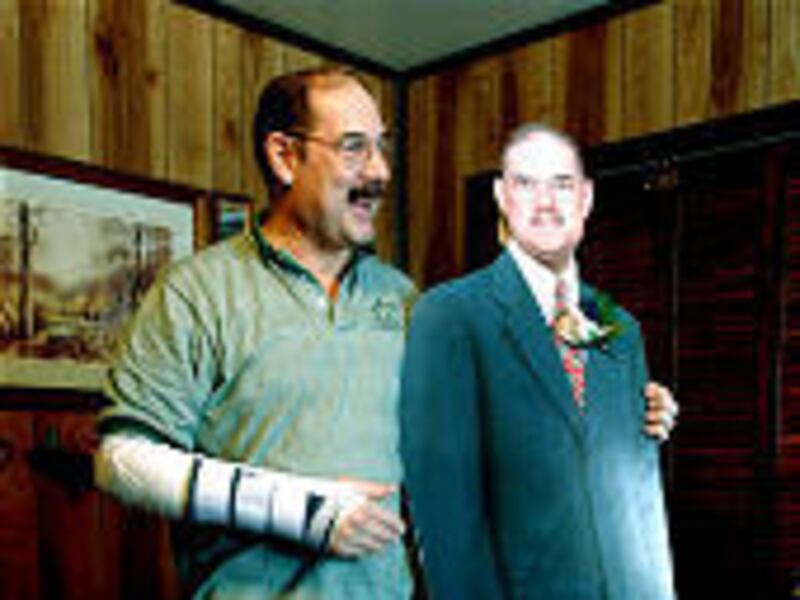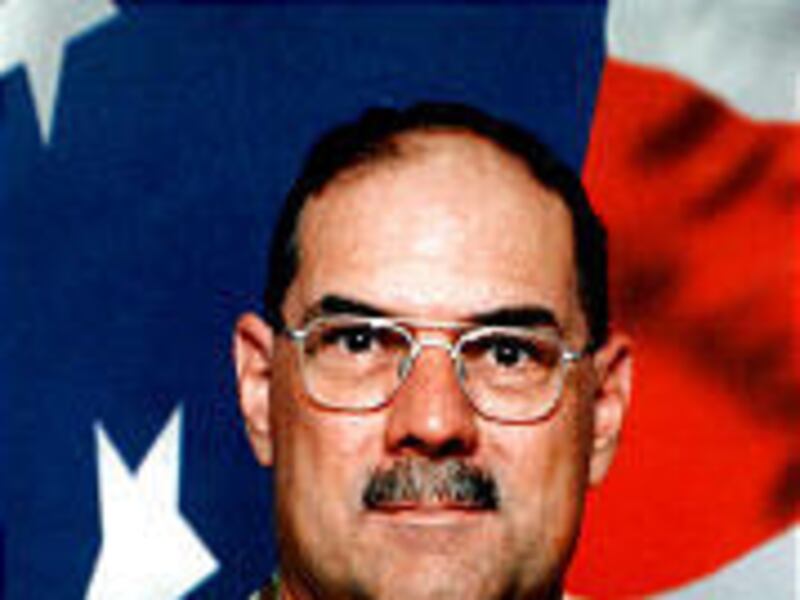MAGNA — When Sgt. 1st Class Tim Woodbrey came home from war shortly before Christmas, he found himself already there — standing stiffly in a corner of the living room, wearing a suit, a boutonniere in his lapel.
He had stood in the living room of his Magna home since shortly after the marriage of a daughter in June 2003.
Actually, only the boutonniere was real. The figure was a nearly life-size cardboard cutout of President Bush, on which a family member had pasted a photo of Woodbrey's face. It was assembled as a stand-in, representing him at the marriage of a daughter that happened while he was serving in Baghdad.
"So I was at the wedding," Woodbrey said. "My wife thought that was pretty nice, because finally I couldn't talk back." Also, he said, "I ate very little."
While it was a joke that family and guests enjoyed, the figure is a poignant reminder that while overseas, Woodbrey and fellow servicemen and women have missed family outings, parties, birthdays, funerals, religious observances and other special events.
"You cannot just put life on hold when you leave. It just doesn't work that way," he said.
Woodbrey, 51, has served in the Utah National Guard for 33 years. As he put it when first interviewed by the Deseret Morning News nearly a year ago while training for war at Fort Carson, Colo., that's longer than some of his fellow soldiers have been alive.
Living at home are his wife, Toni; three sons ages 7, 10 and 17; and a daughter, 24, and her 2-year-old son. Also a black cat, who remembered him when he returned almost 11 months after leaving.
A member of the Utah Army Guard's 211th Aviation Group, he was "on loan" to the Guard's 142nd Military Intelligence Battalion. With the battalion, he went to Fort Carson, leaving on his and Toni's 27th anniversary.
The unit is split up into segments and has served in Iraq, Kuwait and Qatar. The rest of the men and women will remain in the Middle East until April, but Woodbrey was sent back to the United States for surgery to fix a pre-existing tendon problem in an arm.
He is recuperating from the operation, which he had about 2 1/2 weeks ago, and plans to go back to work soon at the Guard's West Jordan headquarters.
Members of the 142nd are military intelligence experts, but when first in the Middle East they were used for security and as drivers for members of the Iraq Survey Group, the special unit that has been searching for weapons of mass destruction.
"It was no difference from other Guard units when we first deployed. When it comes down to brass tacks, everyone's an infantryman."
According to Woodbrey, the Utahns adjusted to the job and performed it fantastically. Later, their responsibilities shifted more toward actual intelligence work.
While in Kuwait, the Utah troops lived in large tents, like circus tents, 25 feet wide and 70 or 75 feet long.
"Definitely not air conditioned," he said. "You would wake up every morning to a layer of dust."
When the frequent dust storms hit, the soldiers would close all the tent flaps. Yet still the fine dust hung in the air inside the quarters, like a fog. They would shake their blankets and sweep the floor.
Because water was scarce, at times the soldiers were authorized to take baths only every three days. But when they arrived in Baghdad around the middle of June 2003, they were assigned to a luxurious palace complex, renamed "Camp Slayer."
The complex had been the home of Baath Party officials. "The building I was living in was a 'Victory Over Iran' building," he said. The name commemorated a not-so-victorious war Iraq had waged against that country.
The adjourning building was misnamed after an even more disastrous war Iraq fought in 1991. It was the "Victory Over America" building. Construction began in 1991 at the time of the first Gulf War, and ended in March 2003.
Work was stopped then by "a couple of cruise missile hits," he noted.
"We actually held our (LDS) sacrament meetings in one of the rooms in that palace."
Because the group is made up of linguists, it attracted more members of The Church of Jesus Christ of Latter-day Saints than most Utah battalions. Most of them have served missions in foreign countries and have learned foreign languages.
The week before he left Baghdad for Qatar, the soldiers moved into mobile trailers with bunk beds and air conditioning. "When the average temperature's around 120 a day, the air conditioning feels pretty darn nice," he said.
He went to Qatar around the middle of July. He and his fellow Utahns worked in a collection point for documents captured from Iraq. In Qatar, Utahns were able to use their intelligence skills, gleaning information from the captured documents.
"It was very interesting work," he said.
It also required intense concentration. At first, they worked for five days, then had a day off, then worked five days. But then the workload became heavier and at times he would forget to take off a day.
He engulfed himself in work and went to LDS meetings. The spiritual comfort helped a great deal, he said.
But he couldn't help missing many things.
"I missed the sound of hearing a train horn," he said. Also, the only aircraft were military, and he missed commercial planes. When a civilian airliner goes over nowadays, he looks up and thinks, "that sure is a nice sight," he said.
"You miss drinking water out of a tap. You miss home cooking, you really do."
Most of all, of course, the soldiers missed their families, sleeping in their own beds, eating in a nice restaurant, "the sights and sounds of home. . . . "
"You gain an insight into the things you miss, and these are the things you're protecting, the things you're putting your life on the line for. . . . You miss everything here."
Telephones and good e-mail access helped ease the burden. But he could not be there when Toni had to deal with water in the basement, three times; major car repairs; re-shingling the home.
He was sent home for his operation and recuperation while his comrades were still in the Middle East. "Perhaps I'd let them down," he worried.
The brigade is a close-knit organization, and the soldiers would "lean on each other for support." He could not help feeling bad about leaving.
One friend told him not to worry. "You've done your time, you've paid your dues," he told Woodbrey. "Just put me in your duffel bag when you leave."
Back home, he found he had to make another adjustment. He needed to get back in sync with the people here.
His family had developed their own way of doing things while he was deployed. "Gee," he realized, "They're more independent now." He had to figure out how to fit in again.
What are his overall feelings about the war in Iraq?
"I think overall we did the right thing," he said.
Recent reports have questioned the prewar intelligence, especially concerning WMDs. But Woodbrey is confident Saddam Hussein was a threat.
"Even though they may not have had stockpiles of of chemical and nuclear and biological weapons, we know they have had chemical weapons because they used them before."
The Iraqi dictator had used chemical weapons on Iran and on his own people. He had never declared he had destroyed the WMDs, Woodbrey said. He possessed missiles that exceeded the allowed range.
And Saddam could have built up stockpiles in the future if allowed to continue in power, he believes.
"We did the right thing," Woodbrey concluded. "We stopped him from actively pursuing them again."
E-mail: bau@desnews.com



